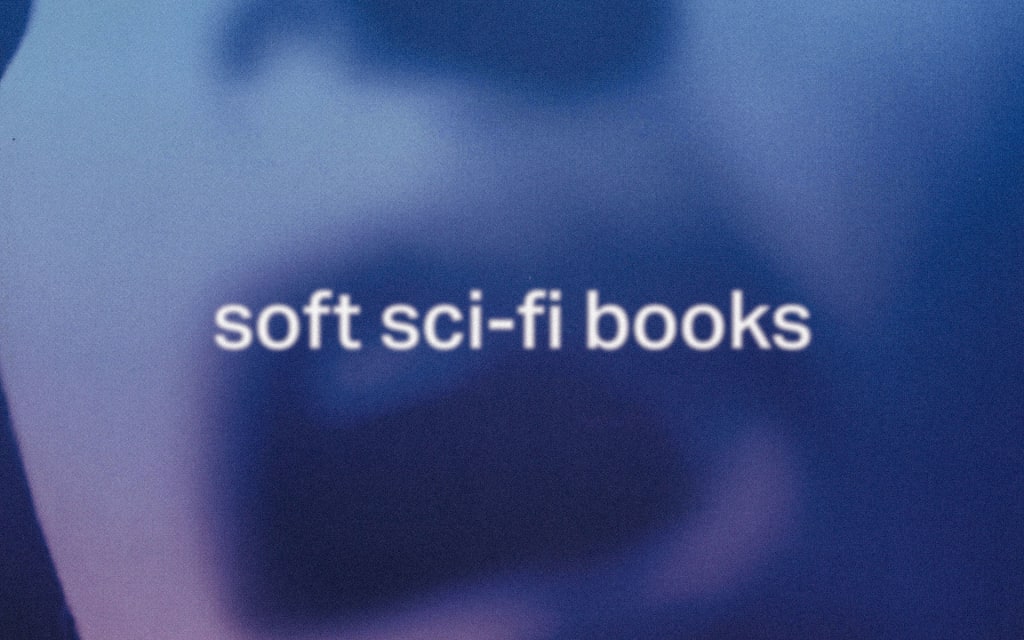Best Soft Sci-Fi Books
Instead of delving deep into the technical and scientific aspects of a story, soft sci-fi books prioritize humanity.

Soft sci-fi books form a treasure trove of ideas combining imagined scientific scenarios, future technologies, and the progression of human society in accordance with these elements. Instead of delving deep into the technical and scientific aspects of a story, these books prioritize humanity. Thus, this brand of science fiction is more concerned about the political, economic, social, and cultural characteristics. This means that a story can still involve space colonization and superior alien races, but the main focus is on the social consequences of these occurrences. If you are looking for science fiction that puts a lot of effort into character development and exploring through the lens of the social sciences, you should definitely check out these soft sci-fi books.
In this stunning debut novel from Audrey Niffenegger, romance becomes deeply explored through time travel. The story follows the peculiar relationship between Clare and Henry. Clare is a young and beautiful artist while Henry has an extraordinary genetic disorder. Specifically, he has the ability to suddenly travel through time. However, he has no control over when this happens and where this will take him. All he can be sure of is that the period and locations he’ll travel to will always be related to his life. While these things happen during the most unexpected moments, Clare has to keep herself together and deal with the possibility that her husband might not even come back. As one of the most successful soft sci-fi books of all-time, The Time Traveler’s Wife manages to tackle romance, free will, and suffering in such an unusual manner.
The Sapir-Whorf hypothesis argues that words, phrases, and language in general dictate how and what humans think. At the least, this principle believes that the use of language affects one’s perspectives. In Samuel R. Delany’s award-winning novel released way back in 1966, this hypothesis becomes the foundation of a thrilling story. In Babel-17, an interstellar conflict has led to the creation of a dangerous language. A person who begins to learn this language will soon develop traitorous tendencies. As the main character Rydra Wong learns more words from this powerful language, her perception becomes manipulated. How can she escape from this language’s grip and defeat the opposing force? Through Babel-17, readers will ponder how the conditions that enable life affect and become affected by the development of meanings and languages.
It is quite fascinating to note that both Babel-17 and Flowers for Algernon won the Nebula Award for Best Novel in the same year. Daniel Keyes’ heart-wrenching novel continues to be relevant even 50 years after it was first released. In Flowers for Algernon, you will follow the life of Charlie, a mentally disabled man who undergoes a phenomenal surgery that drastically changes his life for the better. However, as Charlie enjoys these developments and writes them down in his diary, he notices something alarming. Algernon, the laboratory mouse who underwent the same surgery, has started to show signs of weakness. By examining moral and ethical issues surrounding the mentally disabled, Flowers for Algernon has proven that it is one of the classic soft sci-fi books out there.
Regarded by the Locus Awards as the best science fiction novel before 1990, this fantastic book became the foundation of the classic yet critically divisive film, Blade Runner. The story is set in San Francisco and it takes place after a nuclear war devastated most life forms on the planet. In this dystopian society, animals have become hard to come by and having empathy towards them has become an admirable characteristic. In fact, animal ownership has developed into a status symbol. However, what happens when androids exist with humans, especially if they are believed to lack empathy? Extensively studied for its themes of futuristic technology, the possible progression of androids, and what it means to be a human being, the book offers its readers with a lot of valuable questions to ponder upon.
Just like Philip K. Dick’s most popular sci-fi book, Orson Scott Card’s clever take on space warfare has been adapted into film. Here, children are trained to become ruthless and cunning to prepare for another possible attack from a mighty alien species. Through several tests, the military hopes to identify a future commander. As the first entry in the acclaimed series of the same name, Ender’s Game distinguishes itself from all other soft sci-fi books through its controversial violence and political messages. In one way, Ender’s Game can be seen as a justification for the atrocities of war. On the other hand, the main character of the novel, Ender Wiggins, is one of the best sci-fi examples of someone who has experienced a significant amount of character development.
In 1953, Ray Bradbury managed to create a dystopian novel that will always remain relevant for as long as censorship and manipulation are around. In the three-part Fahrenheit 451, books have officially been banned. It is believed that books are the root of conflict and gloom. Essentially, reading any type of book has become frowned upon and anyone who decides to read one will be punished accordingly. In fact, there are terrifying and futuristic inventions that were specifically built to discover anyone who still has books. While the premise sounds far-fetched, it succeeds in reminding humanity that total censorship should never be tolerated. Moreover, Ray Bradbury’s amazing novel is also a poignant reflection on how the mass media can inhibit reading, which brings about independent and creative thinking.
In the world of science fiction, there is no other saga that can compete with Dune in terms of sheer popularity and critical acclaim. It is noted as one of the best-selling soft sci-fi books of all-time, and fans are still waiting for an immensely skilled director to properly adapt the series. In Dune, readers will follow Paul Atreides as he strives to protect the planet Arrakis. Many are interested in melange, which is a highly valuable substance that can only be found in Arrakis. Thus, Paul Atreides and his family must do whatever they can to stop other forces from taking over. Throughout this highly engaging saga, topics such as politics, religion, and emotions are meticulously explored. Basically, Frank Herbert’s Dune is an excellent look into a futuristic society that has realized interstellar travel.
A Clockwork Orange shares two similarities with Ender’s Game. First, both of them were turned into decent movies. Second, both of these sci-fi books created quite a stir due to some of their questionable content. This book was actually banned from several schools because of its disagreeable language. Moreover, A Clockwork Orange is definitely a book that does not shy away from its depiction of violence. The detailed descriptions of heinous crimes conducted by the main character Alex can easily make anyone squirm, and Stanley Kubrick’s film adaptation is just as brutal. However, this dystopian novel is more than that. Rather than simply being a story of senseless violence, A Clockwork Orange utilizes mayhem to explore free will, redemption, alienation, state punishment, and human nature.
Released in 1932, Brave New World is one of the oldest soft sci-fi books in the world. If human society has finally reached a state where everyone is happy, does it make sense to want to escape from it all? In Aldous Huxley’s masterpiece, citizens are greatly satisfied with the way things are. They live in a society made possible through advancements in psychology and genetic engineering. They can indulge in carnal and physical desires. Still, Bernard Marx doesn’t feel alright with how everything is going. After all, this is a world that has become satisfied with the most basic desires, which are far from what humanity is capable of achieving. In a way, Brave New World shows that being carefree doesn’t necessarily lead to genuine happiness.
It’s often said that Aldous Huxley’s A Brave New World is the perfect contrast to George Orwell’s 1984. If the former dealt with a seemingly perfect society having satisfied citizens, the latter was a representation of a world flooded with censorship and surveillance. Released way back in 1949, this dystopian novel predicted a future where the ruling state is afraid of any opposition, so much so that it became a crime to be critical of the government. Worse, individualism is feared for its ability to develop independent thinking. 1984 is a frightening read, but it is also an essential book that teaches people to speak up and strive for freedom. Thus, 1984 serves as the greatest reminder that soft sci-fi books will always have a place in society.
About the Creator
Stephanie Gladwell
Mother of two, educator of many. Teaches middle-school biology and chemistry. Always interested in exploring the unknown.






Comments
There are no comments for this story
Be the first to respond and start the conversation.